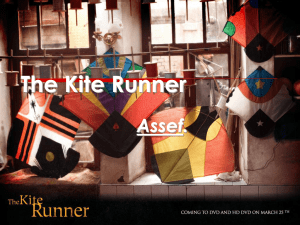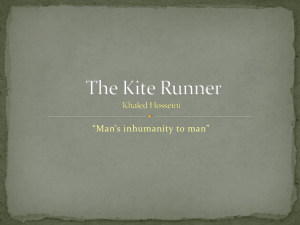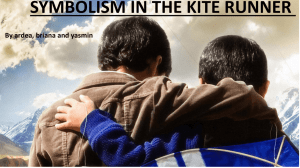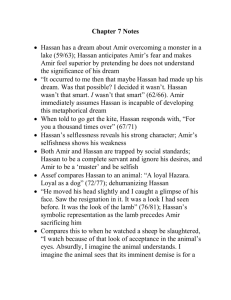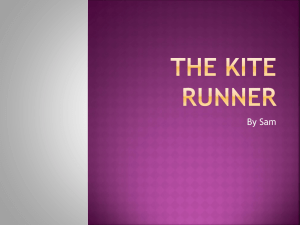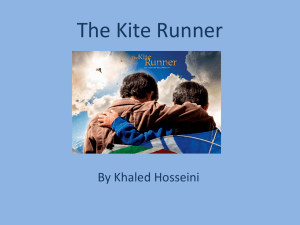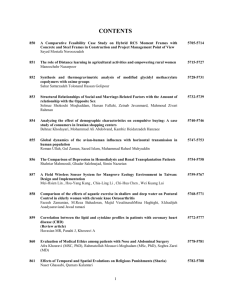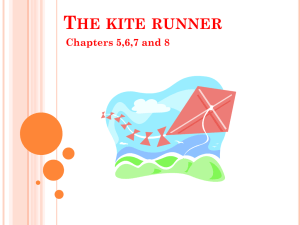The Kite Runner
advertisement
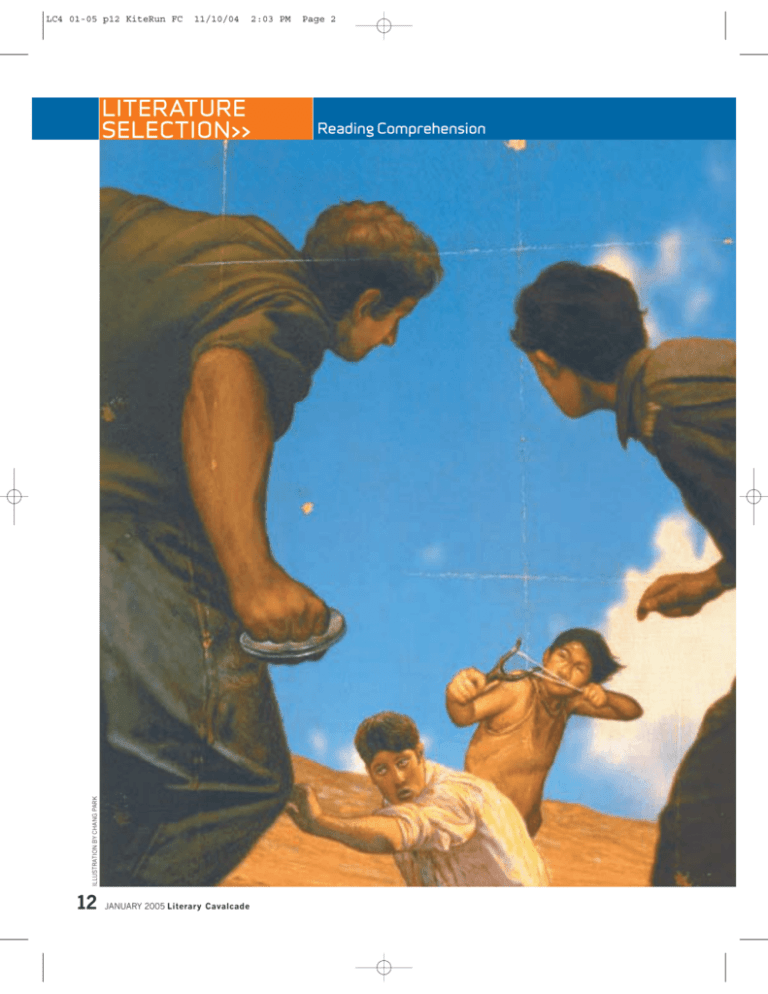
LC4 01-05 p12 KiteRun FC 11/10/04 ILLUSTRATION BY CHANG PARK LITERATURE SELECTION>> 12 JANUARY 2005 Literary Cavalcade 2:03 PM Page 2 Reading Comprehension LC4 01-05 p13 KiteRun FC 11/10/04 2:03 PM Page 3 From the awardwinning novel: Cruelty and friendship meet head-on in this coming-of-age story set in the last peaceful days of Afghanistan KiteRunner The by Khaled Hosseini The Story So Far The setting is Afghanistan in the 1970’s. In the future, the Soviet Union will invade the country and, after fighting a brutal war, withdraw, leaving it in rubble to be taken over by the ruthless Taliban. Here, twelve-year-old Amir and his best friend Hassan (the son of his family’s beloved servant, Ali) face the neighborhood bullies—an encounter that foreshadows Afghanistan’s bleak future. ASSEF WAS THE SON OF ONE OF MY FATHER’S FRIENDS, Mahmood, an airline pilot. His family lived a few streets south of our home, in a posh, high-walled compound with palm trees. If you were a kid living in the Wazir Akbar Khan section of Kabul, you knew about Assef and his famous stainless-steel brass knuckles, hopefully not through personal experience. Born to a German mother and Afghan father, the blond, blue-eyed Assef towered over the other kids. His well-earned reputation for savagery preceded him on the streets. Flanked by his obeying friends, he walked the neighborhood like a Khan strolling through his land with his eager-to-please entourage. His word was law, and if you needed a little legal education, then those brass knuckles were just the right teaching tool. I saw him use those knuckles once on a kid from the Karteh-Char district. I will never forget how Assef ’s blue eyes glinted with a light not entirely sane and how he grinned, how he grinned, as he pummeled that poor kid unconscious. Some of the boys in Wazir Akbar Khan had nicknamed him Assef Goshkhor, or Assef “the Ear Eater.” Of course, none of them dared utter it to his face unless they wished to suffer the same fate as the poor kid who had unwittingly inspired that nickname when he had fought Assef over a kite and ended up fishing his right ear from a muddy gutter. Years later, I learned an English word for the creature that Assef was, a word for which a good Farsi equivalent does not exist: “sociopath.” Of all the neighborhood boys who tortured Ali, Assef was by far the most relentless. He was, in fact, the originator of the Babalu jeer, Hey Babalu, who did you eat today? Huh? Come on, Babalu, give us a smile! And on days when he felt particularly continued ➟ Literary Caval cade JANUARY 2005 13 LC4 01-05 p14 KiteRun FC 11/10/04 2:10 PM Page 4 LITERATURE SELECTION >> ➟ continued from page 13 THE KITE RUNNER inspired, he spiced up his badgering a little, Hey, you flat-nosed Babalu, who did you eat today? Tell us, you slant-eyed donkey! Now he was walking toward us, hands on his hips, his sneakers kicking up little puffs of dust. Hassan retreated behind me as the three older boys closed in. They stood before us, three tall boys dressed in jeans and T-shirts. Towering over us all, Assef crossed his thick arms on his chest, a savage sort of grin on his lips. Not for the first time, it occurred to me that Assef might not be entirely sane. It also occurred to me how lucky I was to have Baba as my father, the sole reason, I believe, Assef had mostly refrained from harassing me too much. He tipped his chin to Hassan. “Hey, Flat-Nose,” he said. “How is Babalu?” by Khaled Hosseini Hassan said nothing and crept another step behind me. “Have you head the news, boys?” Assef said, his grin never faltering. “The king is gone. Good riddance. Long live the president! My father knows Daoud Khan, did you know that, Amir?” “So does my father,” I said. In reality, I had no idea if that was true or not. “‘So does my father,’” Assef mimicked me in a whining voice. Kamal and Wali cackled in unison. I wished Baba were there. “Well, Daoud Khan dined at our house last year,” Assef went on. “How do you like that, Amir?” I wondered if anyone would hear us scream in this remote patch of land. Baba’s house was a good kilometer away. I wished we’d stayed at the house. Classic Connections MORE STORIES OF LIVES TRANSFORMED BY UNLIKELY BOYHOOD FRIENDSHIPS THE BOOK THE FORTRESS OF SOLITUDE: A NOVEL (2003) by Jonathan Letham A SEPARATE PEACE (1959) by John Knowles THE ADVENTURES OF HUCKLEBERRY FINN (1884) by Mark Twain 14 JANUARY 2005 Literary Cavalcade THE STORY THE STYLE Letham chronicles three decades in the difficult friendship between two motherless boys, one black and one white, growing up in a segregated Brooklyn neighborhood in the early 1970s. This compelling novel is as much about America in the 1970s and ‘80s as it is about friendship. Letham’s vivid prose betrays his keen powers of observation and his love for his native city of Brooklyn. At an exclusive New England prep school during WWII, two boys form a complex friendship that brings out the best and the worst in both of them. The story culminates in a betrayal of trust with tragic consequences. Knowles drew from his own experiences as a teenager at an exclusive prep school to write this classic coming-ofage tale. He writes about the struggles of adolescence with great sensitivity. An outcast teenage boy travels down the Mississippi River on a raft with an escaped slave. Together they encounter one adventure after another. Writing with great humor and irony, Twain expresses his complex ideas about society through the simple voice of a young boy. LC4 01-05 p15 KiteRun FC 11/15/04 11:01 AM TURKMENISTAN Page 5 UZBEKISTAN MEET THE AUTHOR: Khaled Hosseini TAJIKISTAN Mazar-e Sharif H I N D U Herat AFGHANISTAN IRAN BORN 1965 in Kabul, Afghanistan. CHINA K U S H KA RA Kabul RA M R Farah KO A N GE v H e l m a nd Ri Kandahar er N INDIA PAKISTAN W E S H ASIA I EUROPE M 0 100 200 In s du Ri Arabian Sea ©KADER SHERZOY “D o you know what I will tell Daoud Khan the next time he comes to our house for dinner?” Assef said. “I’m going to have a little chat with him, man to man, mard to mard. Tell him what I told my mother. About Hitler. Now, there was a leader. A great leader. A man with vision. I’ll tell Daoud Khan to remember that if they had let Hitler finish what he had started, the world would be a better place now.” “Baba says Hitler was crazy, that he ordered a lot of innocent people killed,” I heard myself say before I could clamp a hand on my mouth. Assef snickered. “He sounds like my mother, and she’s German; she should know better. But then they want you to believe that, don’t they? They don’t want you to know the truth.” I didn’t know who “they” were, or what truth they were hiding, and I didn’t want to find out. I wished I hadn’t said anything. I wished again I’d look up and see Baba coming up the hill. “But you have to read books they don’t L SCALE OF MILES AFRICA A AFGHANISTAN ver A Y A S NEPAL give out in school,” Assef said. “I have. And my eyes have been opened. Now I have a vision, and I’m going to share it with our new president. Do you know what it is?” I shook my head. He’d tell me anyway; Assef always answered his own questions. His blue eyes flicked to Hassan. “Afghanistan is the land of Pashtuns. It always has been, always will be. We are the true Afghans, the pure Afghans, not this Flat-Nose here. His people pollute our homeland, our watan. They dirty our blood.” He made a sweeping, grandiose gesture with his hands. “Afghanistan for Pashtuns, I say. That’s my vision.” Assef shifted his gaze to me again. He looked like someone coming out of a good dream. “Too late for Hitler,” he said. “But not for us.” He reached for something from the back pocket of his jeans. “I’ll ask the president to do what the king didn’t have the quwat to do. To rid Afghanistan of all the dirty, kasseef Hazaras.” “Just let us go, Assef,” I said, hating the way my voice trembled. “We’re not bothering you.” LIVES In California with his wife and two children. His family fled Afghanistan in 1980 when he was 15. They received political asylum in the U.S. DAY JOB Physician QUOTE “I wanted to work with people. Something honorable. I never wanted to get up in the morning and feel what I’m doing doesn’t serve a purpose. And I wanted to honor my parents, who brought us to live in San Jose . . . It was very hard for them. My father had been a diplomat, and he took a job as a driving instructor.” continued ➟ Literary Caval cade JANUARY 2005 15 LC4 01-05 p12-17 KiteRun FC 11/10/04 2:42 PM LITERATURE SELECTION >> ➟ continued from page 15 Page 6 THE KITE RUNNER “Oh, you’re bothering me,” Assef said. And I saw with a sinking heart what he had fished out of his pocket. Of course. His stainless-steel brass knuckles sparkled in the sun. “You’re bothering me very much. In fact, you bother me more than this Hazara here. by Khaled Hosseini I looked in his crazy eyes and saw that he meant it. He really meant to hurt me. Assef raised his fist and came for me. There was a flurry of rapid movement behind me. Out of the corner of my eye, I saw Hassan bend down and stand up quickly. Assef ’s eyes flicked to something behind me and widened with surprise. I saw that same look of astonishment on Kamal and Wali’s faces as they too saw what had happened behind me. I turned and came face to face with Hassan’s slingshot. Hassan had pulled the wide elastic band all the way back. In the cup was a rock the size of a walnut. Hassan held the slingshot pointed directly at Assef ’s face. His hand trembled with the strain of the pulled elastic band and beads of sweat had erupted on his brow. “Please leave us alone, Agha,” Hassan said in a flat tone. He’d referred to Assef as Hassan had pulled the wide elastic band all the way back. In the cup was a rock the size of a walnut. Hassan held the slingshot pointed directly at Assef’s face. FROM THE KITE RUNNER BY KHALED HOSSEINI. COPYRIGHT © 2003 BY KHALED HOSSEINI. PUBLISHED BY RIVERHEAD BOOKS, PUBLISHED BY THE BERKELEY PUBLISHING GROUP, A DIVISION OF PENGUIN GROUP (USA) INC. 16 How can you talk to him, play with him, let him touch you?” he said, his voice dripping with disgust. Wali and Kamal nodded and grunted in agreement. Assef narrowed his eyes. Shook his head. When he spoke again, he sounded as baffled as he looked. “How can you call him your ‘friend’?” But he’s not my friend! I almost blurted. He’s my servant! Had I really thought that? Of course I hadn’t. I hadn’t. I treated Hassan well, just like a friend, better even, more like a brother. But if so, then why, when Baba’s friends came to visit with their kids, didn’t I ever include Hassan in our games? Why did I play with Hassan only when no one else was around? Assef slipped on the brass knuckles. Gave me an icy look. “You’re part of the problem, Amir. If idiots like you and your father didn’t take these people in, we’d be rid of them by now. They’d all just go rot in Hazarajat where they belong. You’re a disgrace to Afghanistan.” JANUARY 2005 Literary Cavalcade “Agha,” and I wondered briefly what it must be like to live with such an ingrained sense of one’s place in a hierarchy. Assef gritted his teeth. “Put it down, you motherless Hazara.” “Please leave us be, Agha,” Hassan said. Assef smiled. “Maybe you didn’t notice, but there are three of us and two of you.’ H ASSAN SHRUGGED. TO AN outsider, he didn’t look scared. But Hassan’s face was my earliest memory and I knew all of its subtle nuances, knew each and every twitch and flicker that ever rippled across it. And I saw that he was scared. He was scared plenty. “You are right, Agha. But perhaps you didn’t notice that I’m the one holding the slingshot. If you make a move, they’ll have to change your nickname from Assef ‘the Ear Eater’ to ‘One-Eyed Assef,’ because I have this LC4 01-05 p17 KiteRun FC 11/15/04 11:03 AM Page 7 rock pointed at your left eye.” He said this so flatly that even I had to strain to hear the fear that I knew hid under that calm voice. Assef’s mouth twitched. Wali and Kamal watched this exchange with something akin to fascination. Someone had challenged their god. Humiliated him. And, worst of all, that someone was a skinny Hazara. Assef looked from the rock to Hassan. He searched Hassan’s face intently. What he found in it must have convinced him of the seriousness of Hassan’s intentions, because he lowered his fist. “You should know something about me, Hazara,” Assef said gravely. “I’m a very patient person. This doesn’t end today, believe me.” He turned to me. “This isn’t the end for you either, Amir. Someday, I’ll make you face me one on one.” Assef retreated a step. His disciples followed. “Your Hazara made a big mistake today, Amir,” he said. They then turned around, walked away. I watched them walk down the hill and disappear behind a wall. Hassan was trying to tuck the slingshot in his waist with a pair of trembling hands. His mouth curled up into something that was supposed to be a reassuring smile. It took him five tries to tie the string of his trousers. Neither one of us said much of anything as we walked home in trepidation, certain that Assef and his friends would ambush us every time we turned a corner. They didn’t and that should have comforted us a little. But it didn’t. Not at all. ■ SKILL DRILL CREATE YOUR OWN GLOSSARY TO ACCOMPANY THE EXCERPT. 20-Minute Essay >>TAKE 20 MINUTES TO PLAN AND WRITE AN ESSAY BASED ON THE FOLLOWING: Describe Amir’s feelings about Hassan. Are they conflicted? Use examples from the text to back up your opinion. The excerpt you just read is filled with foreign terms and references to Afghan culture and history. Follow the steps below to create your own glossary. 1 2 3 STOPWATCH: PHOTODISC VIA SODA Go through the text and circle all non-English terms and references to Afghanistan’s culture and history. Include words, ethnic groups, political figures, etc. Compile everything you circled into an alphabetized list. Most of the Farsi terms are defined within the text. Write their meanings in your glossary. Research any names, ethnic groups, or cultural references that are not defined in the text. Write a brief explanation for each. >>Your Turn! Write a short narrative describing an incident from your past that involved you and a close childhood friend. Bring your story to life by including lots of details. LC Book Club Questions 1 What would you say to Assef? Have you ever been confronted by someone like him? How would you describe the narrator’s tone? What effect does it being in the first person have? 2 Literary Caval cade JANUARY 2005 17
